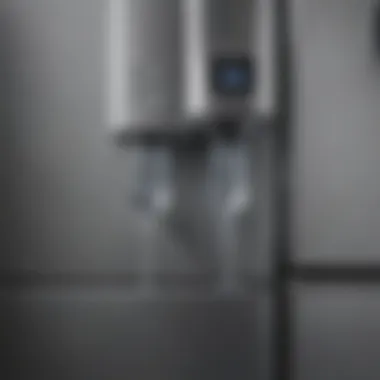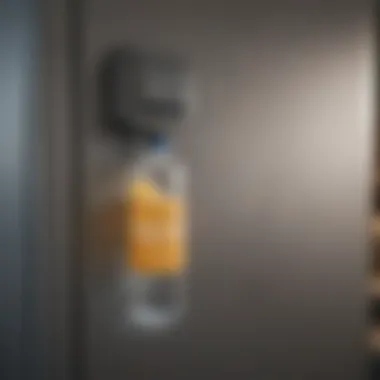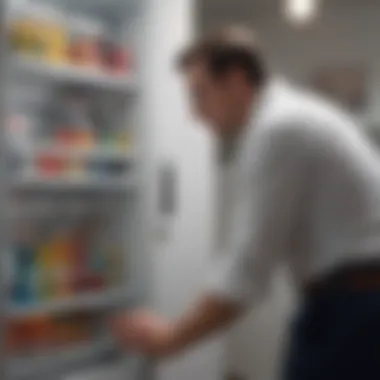Resolving Leaks in Refrigerator Water Dispensers


Intro
A leaking refrigerator water dispenser is a problem many face over time. It can lead to unsightly puddles on your kitchen floor and more serious water damage if left unchecked. Understanding the sources of these leaks is vital. Armed with the right knowledge and troubleshooting steps, homeowners can approach the issue effectively. This article will dissect common causes, solutions, and guidance on whether to take a DIY approach or call a professional.
Key Insights and Trends
When exploring the issue of leaking refrigerator water dispensers, it's crucial to recognize the trends in appliance design and efficiency. Many modern refrigerators emphasize not only energy efficiency but also functional designs that include advanced water filtration systems.
These new models often come equipped with various features that cater to user convenience, such as touch controls and intuitive indicators for water filter changes. However, with these advancements can come complexity, leading to potential issues, such as leaks.
Understanding Water Dispenser Functionality
Water dispensers in refrigerators typically rely on a series of tubes, valves, and a water filter to function. If one part malfunctions, it can affect the entire system. It's beneficial to understand how water flows through these systems. Knowing the components can help identify where the issue lies when a leak occurs.
Common Areas of Concern:
- Water supply line connections.
- Internal reservoir malfunctions.
- Clogged or broken water filters.
Practical Tips and How-To Guides
If confronted with a leaking refrigerator water dispenser, there are several actionable steps you can take before calling for help.
Troubleshooting Guide:
- Check the Water Supply Line
Inspect the water supply connection at the back of the refrigerator. Look for any loose fittings, wear, or cracks. Tightening or replacing a faulty connection may resolve the leak. - Examine the Water Filter
Water filters need regular replacement. A clogged or improperly installed filter can cause water backup and leaks. Remove and inspect the filter for damage. - Investigate the Dispenser Area
Check the area around the dispenser for puddles. Sometimes, the leak originates from the dispenser spout or related components. Clean any residue or ice build-up that may be obstructing proper function. - Test Internal Reservoir
If the refrigerator has an internal water reservoir, check for signs of cracks or leaks. These components can degrade over time and might need replacing. - Consult the Manual
Every model is different. Consulting the user manual specific to your refrigerator brand can offer tailored advice and instructions on troubleshooting.
"Preventive maintenance is easier than repair. Regularly check your appliance for signs of wear or leaks to extend its lifespan."
When to Call a Professional
If your troubleshooting does not resolve the issue, it may be time to contact a professional technician. Consider reaching out to an expert if you notice any of the following:
- Persistent leaks despite attempts to fix.
- Unusual noises from the refrigerator.
- Water pooling in areas beyond the dispenser.
Understanding the nuances of your refrigerator and its water delivery system can mitigate issues. Regular maintenance and informed troubleshooting can prolong the life of your appliance, ensuring it functions efficiently.
For further reading on appliance maintenance, you can visit Wikipedia or check consumer insights on Reddit. These platforms can provide additional tips and shared experiences from other users.
Intro to Refrigerator Water Dispenser Leaks
Understanding the issue of leaking refrigerator water dispensers is crucial for homeowners. Such leaks can lead to not only water damage but also mold growth if left unattended. Addressing this topic thoroughly helps consumers realize that minor water issues can escalate into significant problems. This section sets the stage for exploring leaks, their implications, and the actionable steps that can be taken.
Understanding Water Dispenser Functionality
Water dispensers in refrigerators operate using a system of pipes and valves that transport water from the main supply to the cooling unit. The functionality relies on a delicate balance of pressure and proper seals. Understanding this functionality allows homeowners to identify when something is amiss. Knowing the components involved—including the water reservoir, tubing, and the dispenser mechanism—can facilitate efficient troubleshooting.
Importance of Addressing Leaks Promptly


Promptly addressing any leaks from refrigerator water dispensers is essential. It prevents further damage and ensures the longevity of the appliance. Ignoring small drips may lead to larger flooding incidents or costly repairs. Leaks often indicate underlying issues such as faulty seals or connection problems. Addressing them early can save time and resources in the long run. To emphasize the significance:
"A minor leak today could be a major flood tomorrow."
Homeowners should always inspect their appliances regularly, monitoring for any signs of leakage to maintain a well-functioning household.
Potential Causes of Leaks in Water Dispensers
Understanding the potential causes of leaks in refrigerator water dispensers is crucial for maintaining your appliance and ensuring it operates effectively. Addressing these causes is not just about fixing a leak; it also plays a significant role in preventing further damage and maintaining a healthy living environment. A leak can lead to water pooling under the appliance, which may cause mold growth or damage to flooring. Therefore, recognizing the various factors contributing to these leaks is essential.
Faulty Connections
Faulty connections often serve as a primary source of water leakage in refrigerator water dispensers. These connections link the water supply to the dispenser. Over time, vibrations, temperature changes, and general wear and tear can loosen these fittings. This loosening leads to gaps, allowing water to escape. Check every visible connection for signs of dampness or water stains, as these can indicate where the issue lies. Tightening these connections might resolve the leak, but it is crucial to ensure not to over-tighten, which can cause damage to your appliance.
Worn-Out Seals
Worn-out seals are another common culprit behind leaks in water dispensers. The seals around the water dispenser and its connections age and degrade over time, which affects their ability to create a watertight barrier. A worn seal can lead to constant moisture exposure, resulting in persistent leaks. Homeowners should regularly inspect these seals for cracks or deformities. Replacing seals can help in mitigating leakage and restore the water flow to its intended purpose.
Clogged Water Supply Lines
Clogged water supply lines can obstruct normal water flow, causing excess pressure that eventually leads to leaks. Debris, mineral buildup or even ice can block the lines. These blockages not only cause leaks but can also reduce water pressure and affect the overall functionality of the refrigerator. To address this, the water supply lines should be checked periodically. Flushing the lines or using appropriate cleaning solutions can help maintain clear water pathways.
Defective Water Filter
A defective water filter may incorrectly handle water flow, leading to leaks in the dispenser system. Filters are designed to purify water, but if they become damaged or clogged, they can malfunction. When a filter is not well fitted or is beyond its service life, it can cause water to leak. Regular maintenance of water filters is necessary to avoid this problem. Ideally, filters should be replaced according to the manufacturer's recommendations.
Issues with the Dispenser Button
Lastly, issues with the dispenser button can also contribute to leaks. If the button sticks or does not return to its original position, it may keep the dispenser active longer than intended, resulting in continuous water flow and, consequently, leaks. Evaluating the functionality of the dispenser button is vital. If any faults are noted, repairs or replacements should be conducted as soon as possible to prevent further water wastage and damage.
Troubleshooting Steps for Leaking Dispensers
Addressing a leaking refrigerator water dispenser requires a focused approach to identify and rectify the specific cause of the issue. Effective troubleshooting steps are essential for preventing further water damage and ensuring the appliance operates efficiently. Each step guides homeowners in recognizing potential problems and applying suitable solutions. This not only saves time but can also reduce repair costs.
Inspecting the Water Line Connections
Begin by examining the water line connections. This is a crucial step because faulty connections are often the primary cause of leaks. To do this, turn off the water supply and inspect the connections where the water line links to the refrigerator. Look for:
- Loose fittings: They can cause water to escape. Tightening these might solve the problem.
- Cracks or damage: Any visible damage means it is time to replace the connection.
- Old or incompatible connectors: Ensure all components meet your refrigerator’s specifications.
A thorough inspection can save you from further complications that arise from ignoring minor leaks.
Checking the Water Filter
Next, check the water filter. A clogged or faulty filter can disrupt water flow and cause leaks. Follow these steps:
- Locate the water filter in your refrigerator model. This can usually be found at the back or in the front compartment.
- Remove the filter and inspect it for dirt or blockages. Place the filter under running water to see if it clears out.
- If in doubt, it might be best to replace it entirely. Make sure to use the correct replacement part recommended by your refrigerator’s manufacturer.
Change the filter regularly as per your user manual guidelines to prevent this being a recurrent issue.


Examining the Dispenser Mechanism
Finally, examine the dispenser mechanism. This involves checking the assembly and the button itself for any signs of wear or malfunction.
- Look for cracks or obstructions: Check for any items that may be hindering the mechanism from functioning.
- Assess the button functionality: Press the button to see if it feels jammed or does not spring back properly. If stuck, this could cause continuous leakage.
- Inspect the internal components: If comfortable doing so, detach the dispenser cover and look for any broken parts.
Addressing any faults in the dispenser mechanism will help to ensure a secure and functional water dispensing process.
Remember, addressing leaks early on will contribute to prolonging the life of your refrigerator and avoiding expensive repairs.
Common Fixes for Leaking Water Dispensers
Addressing leaks in refrigerator water dispensers is crucial for maintaining both efficiency and hygiene in your kitchen environment. Not only can these leaks lead to increased water bills, but they can also create a slippery risk on the floor, leading to safety concerns. Understanding common fixes not only saves money on potential repairs but also enhances the lifespan of the appliance. Implementing fixes immediately can prevent more serious issues down the line.
Replacing Worn Seals
Worn seals are often the primary culprits behind leaking water dispensers. Seals can degrade over time due to reuse and exposure to water and temperature changes. When seals lose their integrity, even minor water pressure can lead to leaks. To fix this issue:
- Identify worn seals: Check the area around the dispenser for any cracks or visible damage.
- Purchase replacement seals: Look for the specific seal type compatible with your refrigerator model.
- Installation: Carefully remove the old seal and apply the new one, ensuring a snug fit to prevent future leaks.
Regularly inspecting seals can prevent unexpected leaks and improve the efficiency of the dispenser.
Clearing Clogs in Water Lines
Clogs in the water lines can obstruct proper flow to the dispenser, causing pressure imbalances that may result in leakage. This intervention requires more technical insight but can usually be performed by a cautious homeowner. Here are steps to clear clogs:
- Disconnect the refrigerator: Safety first; unplug it from the wall to avoid electrical accidents.
- Examine water lines: Trace the water line back to the source and look for any blockages.
- Use a safe clearing method: This can include flushing the system with water or using a small pipe cleaner designed for this purpose.
- Reconnect everything: After clearing, reconnect the lines and test the dispenser for leaks.
This is an important fix to ensure a steady and smooth flow of water without unnecessary waste.
Replacing the Water Filter
The water filter is vital for ensuring that the water dispensed is clean and safe for consumption. Over time, filters can become clogged with sediment and impurities, which may cause water pressure to decrease and trigger leaks. Following these steps can effectively replace the water filter:
- Locate the filter: Consult your refrigerator’s manual if unsure where the filter is situated.
- Remove the old filter: Follow the recommended procedure to remove it properly. This usually involves turning or pushing the filter.
- Install a new filter: Insert the new filter, ensuring it is seated properly to create a tight seal.
- Run a test cycle: Dispense water for a few moments to ensure there are no leaks and the flow is normal.
Replacing filters regularly, typically every six months, can significantly reduce the risk of related leakage.
Addressing these common fixes promptly can prevent more serious issues arising from ongoing leaks. Homeowners should not overlook these aspects to maintain their refrigerator's efficiency.
By adopting these common fixes, you ensure that the refrigerator water dispenser functions without disruptions, ultimately contributing to a better home management experience.
When to Seek Professional Help
In the context of addressing leaks in a refrigerator water dispenser, recognizing when to engage a professional is crucial. While many homeowners can manage minor repairs, some issues require the expertise that only trained technicians possess. Determining whether to tackle the problem or seek assistance can save time, money, and prevent further damage to the appliance.
Benefits of Seeking Professional Help
Hiring a professional comes with distinct benefits. These experts are equipped with skills and tools to diagnose issues accurately. They understand the intricacies of refrigerator systems and can provide solutions that an average person may overlook. Moreover, they often guarantee their work, offering peace of mind.
Considerations to Ponder
When determining if professional help is needed, consider factors such as the severity of the leak and your comfort level with DIY repairs. If you suspect that the problem involves intricate components, such as the compressor or electrical parts, don’t hesitate to call for help.


Identifying Complex Issues
Recognizing complex issues can save significant effort and potential financial expense down the line. Not all leaks stem from easily accessible parts. For instance, if your refrigerator exhibits symptoms of refrigerant leakage or problems with the cooling system, these are typically beyond the capability of a non-professional. These types of issues can result in more severe appliance damage or even pose safety hazards.
Common indicators that necessitate expert involvement include:
- Continuous Water Accumulation: If water persists after basic troubleshooting, the cause might be deeper in the appliance.
- Unusual Noises: Strange sounds can indicate components malfunctioning inside the refrigeration unit.
- Electrical Issues: If the water leak coincides with electrical problems, it is wise to contact an expert immediately.
Considering Warranty Coverages
Before making any repairs, it is essential to check whether your refrigerator is still under warranty. Reaching out to the manufacturer can provide insights into what repairs are covered. If the device is still within the warranty period, professional repairs are often warranted at no additional cost.
While seeking help, don’t hesitate to ask the following questions:
- Is the issue covered by the warranty?
- What components will be inspected during the service?
- How long will the repairs take?
Keeping records of past repairs and warranty information can be useful when discussing with a service professional. Also, engaging a licensed technician can preserve warranty status, ensuring peace of mind for future appliance performance.
Preventive Measures to Avoid Future Leaks
Preventive measures are integral to maintaining the efficacy of your refrigerator's water dispenser. By addressing the causes of leaks before they develop into significant issues, homeowners can save both time and money. Leaks are not just inconvenient; they can lead to further damage such as mold, wood rot, and electrical issues. Thus, implementing strategies for prevention is wise and beneficial for long-term appliance performance.
Regular Maintenance of Water Filters
Water filters are a core component of any refrigerator with a water dispenser. They should be regularly maintained to ensure optimal functionality. Clogged or dirty filters can create pressure imbalances, potentially leading to leaks. It is best practice to replace these filters according to the manufacturer's instructions, typically every six months.
- Keep a schedule: Mark your calendar for filter changes.
- Use genuine filters: Always opt for the filters recommended by the refrigerator's manufacturer.
- Monitor water quality: If you notice changes in water clarity or taste, consider inspecting the filter sooner than planned.
Failing to replace the filters not only risks leaks but can diminish the quality of water dispensed. Consequently, regular maintenance will help to prolong the life of the appliance and improve its efficiency.
Periodic Inspection of Water Lines
Another preventive measure is the periodic inspection of water lines. Water lines can develop kinks or leaks over time due to wear and tear or improper installation. During your inspections, look for signs of wear, corrosion, or loose connections.
- Routine checks: Visual inspections every couple of months can catch small issues before they escalate.
- Secure connections: Ensure that all water line connections are tight but not overtightened, as this can cause damage.
- Look for moisture: Any signs of moisture around the refrigerator's base indicate potential leaks that need attention.
Performing these inspections aids in preemptively identifying problems that could affect your water dispenser. By ensuring the integrity of water lines, you can effectively prevent unnecessary repairs and enhance the longevity of your appliance.
"A well-maintained appliance not only functions better but also contributes positively to household efficiency and safety."
Closure
In this article, we have explored the intricate issue of leaking refrigerator water dispensers. Understanding the root of these leaks is crucial to maintaining appliance efficiency. Prompt attention to leaks prevents greater issues, such as water damage or mold growth. Addressing leaks not only preserves your appliance but also ensures water quality for everyday use.
Summarizing Key Takeaways
Several key points emerge from our exploration:
- Leaks can stem from faulty connections, worn-out seals, clogged supply lines, defective filters, or issues with the dispenser button.
- Troubleshooting involves inspecting various components like water lines and filters to identify the source of the leak.
- Common fixes include replacing seals, clearing clogs, and changing filters, which are often manageable tasks for homeowners.
- Knowing when to seek professional help is essential, especially for complex issues that go beyond basic repairs.
- Preventive measures, such as regular maintenance, can significantly reduce the risk of future leaks.
Taking the time to understand these aspects not only enhances your appliance's lifespan but also contributes to better overall home management.
Encouragement for Ongoing Appliance Care
Maintaining your refrigerator, especially its water dispenser, should be a consistent effort. Regularly check filters and inspect water lines to catch any potential issues before they escalate. Make it a habit to clean the dispenser area regularly and look for signs of wear or leaks. This proactive approach can lead to long-term savings and minimize inconvenience.



